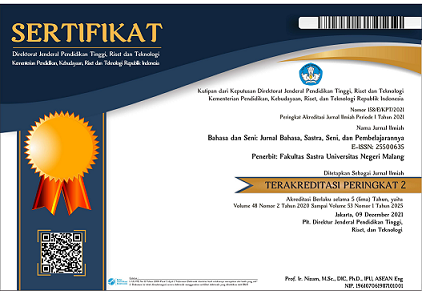POSSIBLE TECHNIQUES FOR TRANSLATING PERSONAL NAMES IN CHILDREN AND YOUNG ADULT LITERATURE
Abstract
Personal names are considered “specific words”and thus most often kept untranslated. However, as translation theory has developed, making it not only changing language features but also mediating cultural aspects, personal names are reconsidered in translation. Since they are culturally bound, this study aims to find out, when personal names are translated, what translation strategies apply and why. The data were collected from the weekly comic Donal Bebek (2018) as well as from the Hunger Games trilogy novels written by Suzanne Collins (2008, 2009, 2010) and translated by Hetih Rusli (2009, 2010, 2012). The findings show that translating personal names in children literature can be more complicated than translating thosein literature for older readers. This study has found out that four strategies (preservation, naturalization, couplet, and adaptation) are used to approach the personal names translation for the children literature; and only two strategies (preservation and literal translation) are applied to the translation of those in young adult literature. Reasons for using such strategies are as follows: several aspects (such as connotation, pronunciation, and style) have been considered when translating personal names in children literature, while they are more flexible when translating personal names in young adult literature.
Full Text:
PDFReferences
Abdolmaleki, S.D. 2012. Proper Names in Translation: an Explanatory Attempt. The Social Sciences, 7(6), 832-837.
Al-Hassan, A., & Jordan, A. 2013. The Importance of Culture: Should Culture be Translated? International Journal of Applied Linguistics & English Literature, 2 (2), 96-100.
Anonym. 2018. Donal Bebek. 1906th Edition. Jakarta: PT Penerbitan Sarana Bobo under the licence from The Walt Disney Co.
Anonym. 2018. Donal Bebek. 1907th Edition. Jakarta: PT Penerbitan Sarana Bobo under the licence from The Walt Disney Co.
Collins, Suzanne. 2008. The Hunger Games. United States: Scholastic Press.
Collins, Suzanne. 2009. Catching Fire. United States: Scholastic Press.
Collins, Suzanne. 2009. The Hunger Games. Translated by Hetih Rusli. Jakarta: Gramedia Pustaka Utama.
Collins, Suzanne. 2010. Catching Fire. Translated by Hetih Rusli. Jakarta: Gramedia Pustaka Utama.
Collins, Suzanne. 2010. Mockingjay. United States: Scholastic Press.
Collins, Suzanne. 2012. Mockingjay. Translated by Hetih Rusli. Jakarta: Gramedia Pustaka Utama.
Denham, K. & Lobeck, A.. 2013. Linguistics for Everyone: An Introduction. 2nd Ed. USA: Wadsworth, Cengage Learning.
Heriyati, 2010. Kamus Gaul Bahasa Inggris. Yogyakarta, Indonesia: Mizan Media Utama.
Jaleniauskienė, E. & Čičelytė, V.. 2009. The Strategies for Translating Proper Names in Children’s Literature. Studies about Languages, 15, 31-42.
Muhartoyo & Wijaya, B.S..2014. The Use of English Slang Words in Informal Communication among 8th Semester Students of English Department in Binus University. Humaniora, 5 (1), 197-209
Newmark, P.. 1988. A Textbook of Translation. Pearson Education Limited.
Pour, B.S. 2009. How to Translate Personal Names. Translation Journal, 13(4), 1-13.
Simanjuntak, H.L..2014. The Translation of Articles “A/An” and “The” Into Indonesian. UG Jurnal, 8 (2), 9 -1 2
Zarei, R. & Norouzi, S.. 2014. Proper Nouns in Translation: Should They Be Translated? International Journal of Applied Linguistics & English Literature, 3 (6), 152-161.
Zhou, Y. & Fan, Y..2013. A Sociolinguistic Study of American Slang. Theory and Practice in Language Studies, 3 (12), 2209-2213.
Refbacks
- There are currently no refbacks.

This work is licensed under a Creative Commons Attribution 4.0 International License.

Dear Sir/Madam
We appreciate your continued confidence and trust in Bahasa dan Seni: Jurnal Bahasa, Sastra, Seni, dan Pengajarannya (JBS). In order to enhance the service, readability, and quality of JBS publications, we will be transitioning to a new website, https://citeus.um.ac.id/jbs, in collaboration with Digital Commons (Elsevier) starting in July 2024.
Sincerely
Yusuf Hanafi
(Editor in chief)















2.png)